
Africa Source
Encyclopedia

Free software
Free software, software libre or libre software is software that can be used, studied, and modified without restriction, and which can be copied and redistributed in modified or unmodified form either without restriction, or with restrictions that only ensure that further recipients can also do...
(FLOSS
Alternative terms for free software
Alternative terms for free software have been a controversial issue among free software users from the late 1990s onwards. Coined in 1983 by Richard Stallman, "free software" is used to describe software which can be used, modified, and redistributed with little or no restriction...
) among non-profit and non-governmental organisations. Africa Source is part of the wider "Source Camps" organised by Tactical Technology Collective
Tactical Technology Collective
The Tactical Technology Collective is an international nongovernmental organization that trains rights advocates to deploy "information and communications technologies - social media tools, mobile phones, digital security and information design." It works with groups in "developing and transition...
(Tacticaltech.org) and its partners, and is also linked to the Asia Source and other parallel events held elsewhere in the "developing" world.
Venue, agenda for Africa Source 2
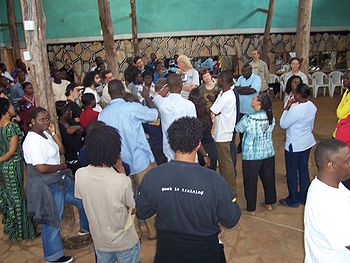
Kalangala
Kalangala is the 'chief town' of Kalangala District in Central Uganda. It is the location of the headquarters of Kalangala District. The district is named after the town.-Location:...
, an island on Lake Victoria
Lake Victoria
Lake Victoria is one of the African Great Lakes. The lake was named for Queen Victoria of the United Kingdom, by John Hanning Speke, the first European to discover this lake....
, in Uganda
Uganda
Uganda , officially the Republic of Uganda, is a landlocked country in East Africa. Uganda is also known as the "Pearl of Africa". It is bordered on the east by Kenya, on the north by South Sudan, on the west by the Democratic Republic of the Congo, on the southwest by Rwanda, and on the south by...
. Organisers announced that the Africa Source II agenda was to be developed for the following primary target audiences:
- NGO (non-government organisation) IT practitioners working with educational institutions, resource and community centres, rights based NGOs and health information organisations
- IT developers, advocates and implementors
- People interested in the localization of software
Themes
Main themes for the event were:- migration and adoption
- alternative access, education and resource centres;
- information handling and advocacy;
- localisation
Issues for debate at Africa Source 2
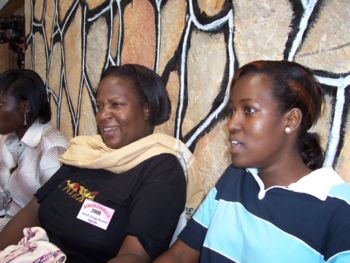
Two issues divided campers at Africa Source 2 like no other. Perhaps these
were meant to. One was: FLOSS is still too complicated for non-profit
organisations and schools to use. The other: It's more critical to translate
FLOSS into African languages, compared to training to use existing (FLOSS)
software". Issues like these split public opinion at Africa Source 2 along the spectogram of various possible positions.
From New Delhi, Arun Mehta argued that FLOSS still needed to be much more
accessible to the disabled. Others saw it differently: "What have NGOs done
to make it more user-friendly? This is not software you buy; this is
software you create," said one voice.
Derick Odembo of Kenya
Kenya
Kenya , officially known as the Republic of Kenya, is a country in East Africa that lies on the equator, with the Indian Ocean to its south-east...
and Mozambique
Mozambique
Mozambique, officially the Republic of Mozambique , is a country in southeastern Africa bordered by the Indian Ocean to the east, Tanzania to the north, Malawi and Zambia to the northwest, Zimbabwe to the west and Swaziland and South Africa to the southwest...
agreed that it was still difficult to migrate. Dwayne from South Africa
South Africa
The Republic of South Africa is a country in southern Africa. Located at the southern tip of Africa, it is divided into nine provinces, with of coastline on the Atlantic and Indian oceans...
claimed his grandmother had learnt to use Firefox (the web browser
Web browser
A web browser is a software application for retrieving, presenting, and traversing information resources on the World Wide Web. An information resource is identified by a Uniform Resource Identifier and may be a web page, image, video, or other piece of content...
) and she was a hundred years old!
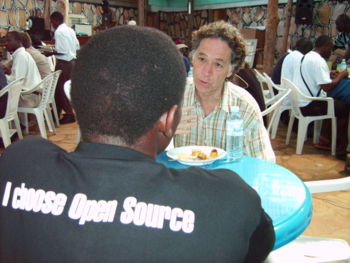
Rudi from South Africa argued strongly in favour of those who "taught a man
to fish, rather than just gave him a fish". He said he's seen more people on
the FLOSS side teach others and work towards a solution than those who just
complain about usability.
Ivar Mugabi of Uganda cautioned against "doing nothing but training guys
when they don't understand the stuff". Deborah Aknwande, also of Uganda,
made her point. Somebody else laughed, "Hey, this is
everybody-understands-English stuff," said someone on the side which
stressed on the importance of translation and localisation of software.
Dirk Slater, who worked as an eRider
for seven years stressed the 70:20:10 principle for NGOs and non-profits. He called this a "very important formula". And, he stressed 10% of resources needed to go to hardware, 20% to software, and 70% needed to go to training!
Charles Loku of Uganda called for a more detailed form of localisation. Why
not call it M'bata (Swahili for "duck") rather than Mandrake, he asked.
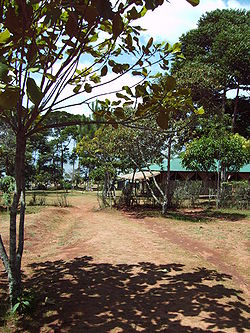
users and more techies. We the Arabs have to solve our own (Arab)
localisation issues. If we have training and more users, we would be better
able to handle this," he suggested.
Other participants felt that people stressing localisation generally came from larger tribes, and were people who used well documented languages. What happened to smaller language groups, he asked? And thus the debate raged.... only to show that FLOSS has its many shades of grey.
Options for participants
Africa Source II offered participants a possibility of taking one of three possible "tracks": either look to 'migration for NGOs', 'migration for education' or the 'information management' track.While the first was aimed to help shift non-profits over to Free/Libre and Open
Source Software (FOSS or FLOSS), the second was aimed at making the same possible for those working in the field of education. There was another track to help participants focus on the 'soft' skills, and the 'information' part of the IT world, that often gets overlooked and sidetracked.
Infotrack
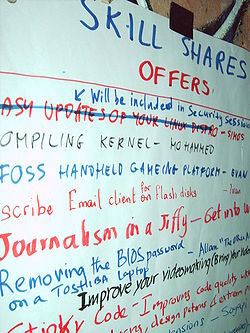
After breaking in groups and listing their expectations, it was found that
some wanted ideas on how to network and collaborate with other organisations. Someone had a query: could they find out how and if blogs could be useful to Africa.
Other issues came up too: Could blogs be used to create communities? Is there some way of better understanding this entire phenomenon of social software (including wikis, blogs, social networking, social bookmarking)? Can FLOSS offer tools for donor-management and member-management? Is there some replacement for web-design tools and Flash animation? Is it possible to extend skills by undertaking online mentoring for non-profits via the Net and encourage them to get their information out....
Africa Source, the first camp
Africa Source's first camp was held from March 15 to 19, 2004 at Okahandja, Namibia. According to the website focused on this event, some 60 participants "from all across Africa met for discussion, peer learning and skillshare". This event's focus was on "the practical challenges of realising F/OSS [Free/Libre and Open Source Software] in the African context, the aim was to build cooperation between Africa's most active F/OSS individuals and projects in the longer term."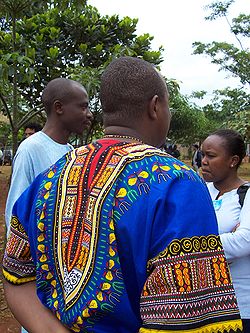
Africa Source's first camp was organised by Tactical Tech, AllAfrica and SchoolNet Namibia. It was supported by the Open Society Initiative for Southern Africa
Open Society Initiative for Southern Africa
Open Society Initiative for Southern Africa is a Southern African organization which "collaborates with other organizations on issues surrounding the rule of law, democracy building, human rights, economic development, education, the media, and access to technology and information...
(OSISA), Open Society Initiative for West Africa
Open Society Initiative for West Africa
Open Society Initiative for West Africa is a West African organization which promotes democratic values. OSIWA "believes that it best serves by sustaining catalytic and innovative initiatives that add value to the efforts of West Africa's civil society." OSIWA also believes in the value of...
(OSIWA), OSI Budapest, USAID and O'Reilly, according to its organisers.

